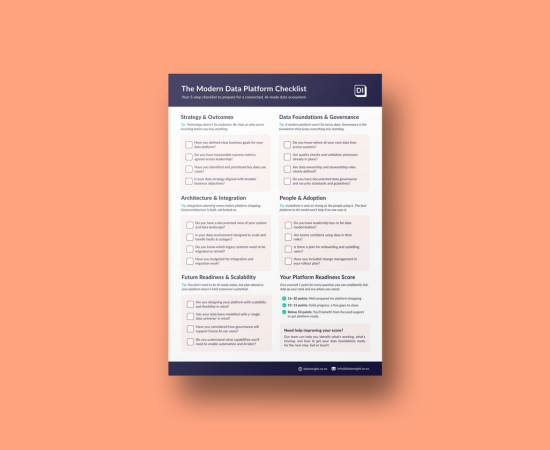You’ve hired a data analyst to help your organisation become more data-driven. Now what?
If your team isn’t set up to support that new hire, you risk stalled projects, wasted investment, and frustrated talent.
Here’s how to fix it before things start to unravel:

What Happens When You Hire Without a Plan for Support
You’ve done what every article told you to do. You hired a full-time data analyst. Or a contractor. Maybe even brought in a global consultancy.
That should be enough, right? Not quite.
Hiring data expertise is only step one. The next – and often forgotten – step is making sure your expert has what they need to do the job.
Without structure and support, your new hire can get stuck in the weeds: chasing access, fixing reports, or building dashboards no one uses.
In short: You don’t have a data problem. You have a support problem.
What Kind of Support Do Data Analysts Actually Need?
Support doesn’t mean micromanagement or layers of approval. It means:
- Clear priorities – so your expert isn’t stuck guessing what matters
- Access to tools, teams, and data context – so they can act fast
- Sustainable delivery plans – so results don’t disappear with staff turnover
- A flexible, scalable model – so your setup grows with your business
Support should be built into your Ways of Working, not treated as an afterthought.
What Are the Hidden Costs of Not Supporting Your Data Team?
Problems don’t always show up straight away. But when support is missing, you’ll start to see:
- Projects stall or drag on
- Business priorities constantly shift
- Dashboards get built, but no one uses them
- Talent gets stretched thin, disengaged, or leaves
- Key person risk increases
Without clear ownership and alignment, data work drifts. Your experts end up plugging gaps instead of driving strategy.
What You Can Do to Set Your Data Team Up for Success
Whether you’ve hired a full-time analyst, brought in a contractor, or partnered with a consultancy, one thing stays the same: support makes or breaks the impact.
Internal hires need onboarding, tools, and clarity. Contractors need clear scopes and handover plans. Consultancies bring deep expertise but may lack the flexibility to shift with your team’s needs. No matter the model, structure is what turns data effort into business value.
If you’ve recently hired a data expert, or are about to, here are four ways to make sure they’re set up to deliver value:
- Clarify ownership: Assign someone who is accountable for prioritising work, removing blockers, and aligning outcomes with business goals.
- Map out access and tools early: Don’t wait for analysts to chase logins. Document the systems they need and streamline onboarding from day one.
- Create a living delivery plan: Make sure every project has clear objectives, milestones, and knowledge-sharing practices that will hold up even if your team changes.
- Build flexibility into your data model: Whether your support comes from internal hires, contractors, or partners, your ways of working should adapt as your needs evolve.
The Bottom Line: The Right Support Makes All the Difference
Hiring a data analyst is a smart move, but it’s only the first step. For New Zealand organisations, where teams are often lean and expectations are high, the difference between success and stagnation comes down to support.
With the right structure, access, and alignment in place, your data talent becomes a strategic force, not a stranded resource.
Ready to make your data team high impact, not high friction?
We help organisations build the support, structure, and strategy that turn data hires into results
Talk to us about how we can help.
------------------------------------------------------------------------------------------------------------------
This blog is part of our series on building smarter, more scalable data capability in NZ organisations. You might also like:
Smarter Ways to Scale Your Data Capability | Get Better ROI on Data Projects Why Global Best Practices Don’t Always Work Locally








.png)